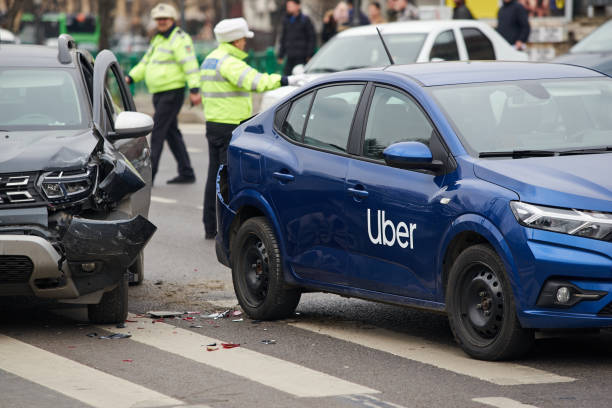Ansonia Rideshare Accident Lawyer
Do you need a Ansonia rideshare accident lawyer? If you or a loved one has been involved in an accident with an Uber, Lyft, or rideshare driver—whether as a passenger, another driver, or even a pedestrian—you have rights. Understanding these rights and navigating the complexities of rideshare accident claims requires the help of an experienced attorney. At Etemi Law, we are dedicated to helping victims of rideshare accidents receive the compensation they deserve.
Call us today at (203) 409-8424 for a


The Reality of Rideshare Accidents
Uber and Lyft have revolutionized transportation, providing millions of rides daily across the U.S. However, with the rise of these services, the number of rideshare-related accidents has also increased. Research from Rice University and the University of Chicago suggests that ridesharing services have contributed to a 2-3% increase in U.S. traffic fatalities since 2011, leading to up to 1,100 deaths annually.
Common Causes of Rideshare Accidents
Uber and Lyft drivers often operate under challenging conditions, increasing their risk of accidents. Some of the most common causes include:
- Distracted Driving – Relying on GPS, accepting ride requests, and managing passengers can divert a driver’s attention.
- Driver Fatigue – Many rideshare drivers work long hours or multiple jobs, leading to drowsy driving.
- Unfamiliar Routes – Navigating new areas can cause sudden stops or erratic driving behavior.
- Poor Vehicle Maintenance – Rideshare drivers are responsible for keeping their vehicles in good working condition, but lapses can lead to preventable accidents.
Connecticut Rideshare Laws and Regulations
Connecticut has strict laws governing rideshare companies and their drivers. These include:
- Mandatory Background Checks – Uber and Lyft must conduct background checks on all drivers, including a criminal record and driving history review.
- Vehicle Safety Requirements – Vehicles must pass inspections and meet specific safety criteria.
- Insurance Coverage – Rideshare companies must provide at least $1 million in liability coverage when drivers are transporting passengers.
- Driver Hour Limits – Uber and Lyft drivers can work a maximum of 14 consecutive hours and 16 hours in a 24-hour period to prevent fatigue-related accidents.
Who is Liable in a Rideshare Accident?
Determining liability in an Uber or Lyft accident can be complex, as multiple insurance policies may be involved. Our legal team at Etemi Law will investigate your case to establish liability and maximize your compensation.
If Another Driver is At Fault
- The at-fault driver’s insurance is the first line of compensation.
- If the at-fault driver is uninsured or underinsured, Uber/Lyft’s uninsured motorist coverage may apply.
If the Rideshare Driver is At Fault
- If the driver was logged into the app and waiting for a ride request, Uber/Lyft provides $50,000 per person/$100,000 per accident in bodily injury coverage.
- If the driver was transporting a passenger, Uber/Lyft provides $1 million in liability coverage.
- If the driver was off duty, their personal auto insurance applies.
Why You Need a Ansonia Uber and Lyft Accident Lawyer
Rideshare accident cases involve multiple insurance companies and complicated liability issues. Insurance companies often try to minimize payouts, but with an experienced attorney from Etemi Law, you can fight for the full compensation you deserve.
Our legal team will: ✅ Investigate the accident thoroughly ✅ Obtain key evidence, including rideshare records and driver logs ✅ Negotiate aggressively with insurance companies ✅ Take your case to court if necessary
Contact Etemi Law Today
If you or a loved one has been injured in an Uber or Lyft accident, don’t wait. Protect your rights and get the compensation you deserve. Contact Etemi Law today for a free consultation.
📞 Call us at (203) 409-8424 💻 Visit us online to schedule your case review
In Ansonia, winter turns familiar corridors into hazards: black ice and leaf-slick spots often gather in the Naugatuck River valley, catching rideshare drivers and riders off guard. On Route 8 and along Main Street, sudden freezes change merge behavior and braking distances, turning routine pickups at Ansonia Station into risky maneuvers. I’ve seen how a fast, quiet patch of ice can convert a commuter run into a collision with soft tissue and fracture patterns.
When collisions happen, the nearest emergency response often routes to Griffin Hospital, where winter surges and ambulance delays are real constraints. Rideshare users injured in upper-body, head, or lower-extremity impacts report longer on-scene stabilization when crews contend with icy shoulders. Transfers from Griffin to specialized centers in New Haven or Bridgeport can stretch transport times, altering early rehab windows and follow-up scheduling.
Patterned crashes here often involve slipping during curbside pickups, run-off-road slides near bridge approaches, and secondary strikes when following distances fail on slushy descents. Rideshare mechanism details — whether a driver braked early, the car was idling for warming, or the passenger exited onto a slick curb — shape soft-tissue diagnoses, compound fractures, and the need for interfacility transfers for orthopedic or neurological care.
As a reporter in the valley I watch how winter delays ripple through recovery: missed physical therapy because roads are closed, longer waits for imaging when clinics run on reduced hours, and rehabilitation that shifts from outpatient to extended home care. Keep notes of pickup pins, driver details, and timing around the Naugatuck River embankments and at the Ansonia Station lot — those local facts matter when reconstructing sequence and treatment timing.
